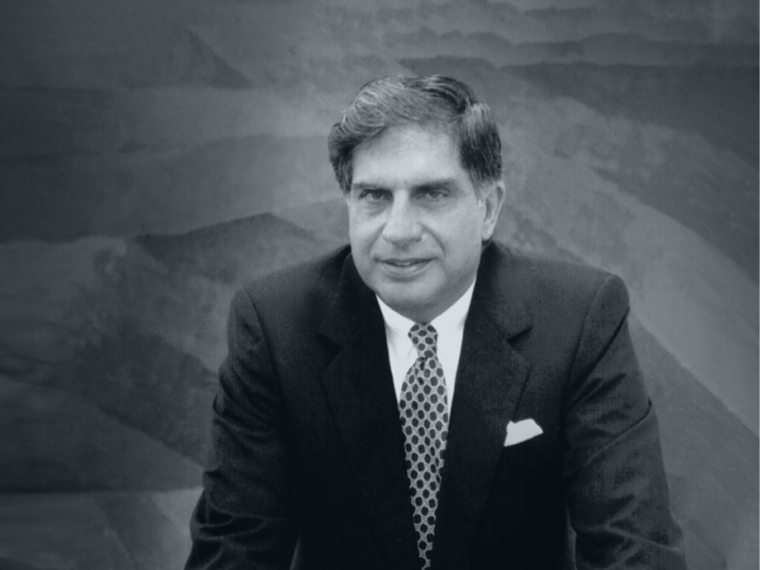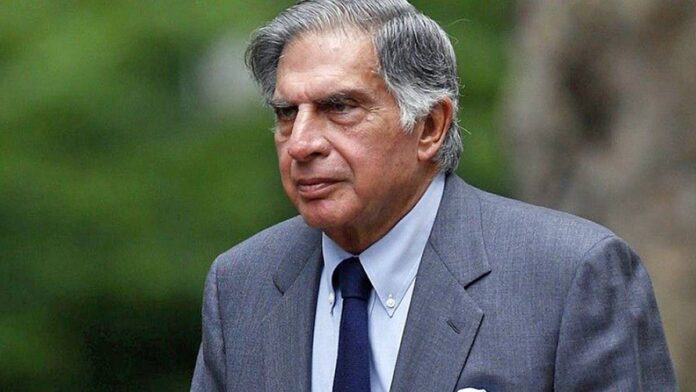Ratan Tata, visionary industrialist and Chairman Emeritus of Tata Sons, passed away at 86, leaving behind a legacy of ethical leadership and transformative contributions to global business and philanthropy.
Ratan Naval Tata, one of India’s most iconic and visionary industrialists, passed away on Wednesday at the age of 86, marking the end of an era for Indian industry and global business. The Chairman Emeritus of Tata Sons and the man who shaped the Tata Group into a global powerhouse, Tata breathed his last at Breach Candy Hospital in Mumbai. His passing leaves a profound void in the world of business, philanthropy, and leadership.

A towering figure in Indian industry, Ratan Tata’s leadership and his emphasis on ethical business practices earned him respect not only in India but across the globe. Under his stewardship, the Tata Group, one of India’s oldest and largest conglomerates, expanded its presence worldwide, acquiring some of the most well-known brands and companies across various sectors. Despite this vast success, Tata was known for his humility, quiet demeanor, and deep commitment to social responsibility.
A Humble Beginning and A Global Vision
Born on December 28, 1937, in Mumbai, Ratan Tata hailed from one of India’s most illustrious families. He was adopted by Naval Tata, and later raised by his grandmother, Lady Navajbai Tata. After his schooling in Mumbai, he studied architecture at Cornell University and pursued further management studies at Harvard Business School. Despite his elite education and the privilege of being born into a wealthy family, Tata always stayed grounded, showing a keen interest in all levels of business operations.

He began his career with Tata Steel in 1961, working on the shop floor as an apprentice. It was here that Tata developed a deep understanding of the operational intricacies of the Tata Group, gaining insights into the challenges faced by both employees and the management. This experience played a crucial role in shaping his leadership style, which emphasized empathy, worker welfare, and responsible management.
In 1991, Tata took over as the Chairman of Tata Sons from his legendary predecessor, J.R.D. Tata. This transition was met with some skepticism from both within and outside the Tata Group, as many questioned whether Ratan Tata could fill the enormous shoes left by his predecessor. However, he quickly silenced his critics by leading the company through an era of unprecedented growth and transformation.
Expanding Tata Group’s Global Footprint
Under Tata’s leadership, the Tata Group became a global powerhouse, expanding its operations far beyond India’s borders. Some of the most notable milestones of his tenure include the acquisitions of iconic global brands such as Tetley Tea, Corus Steel, and Jaguar Land Rover. These acquisitions not only cemented Tata Group’s position on the world stage but also marked India’s growing economic clout.
The 2008 acquisition of Jaguar Land Rover (JLR) by Tata Motors, which was seen as a bold move, turned out to be one of the biggest success stories under Ratan Tata’s leadership. While the purchase raised eyebrows, with many questioning whether an Indian company could successfully run a British luxury carmaker, the move paid off. JLR emerged as one of Tata Motors’ most successful subsidiaries, contributing significantly to the company’s global profits.

Similarly, Tata’s acquisition of Corus Steel in 2007 and Tetley Tea in 2000 showcased his commitment to transforming Tata Group from a largely domestic company to a multinational conglomerate. Through these strategic moves, Tata not only expanded the company’s global footprint but also diversified its revenue streams, making it resilient in an increasingly competitive global market.
A Legacy Beyond Business
Ratan Tata was much more than just a business leader; he was also a visionary philanthropist. Deeply committed to social causes, he believed that businesses should exist not just to generate profit but to contribute to the betterment of society. His guiding principle was simple: “Businesses need to go beyond profit-making and ensure that the society around them is benefited.” This philosophy shaped much of Tata Group’s corporate social responsibility (CSR) initiatives.
Through the Tata Trusts, which control a majority of Tata Sons, Ratan Tata focused on causes like education, healthcare, rural development, and infrastructure. Under his leadership, Tata Trusts became one of India’s most influential charitable organizations, providing funding for numerous initiatives that uplifted underprivileged communities across the country.
Tata was also known for his compassion and humanity. During the 26/11 terrorist attacks in Mumbai in 2008, the Taj Mahal Palace Hotel, owned by the Tata Group, was one of the primary targets. Despite the devastation, Tata personally ensured that the families of the victims, including the hotel staff, were taken care of. The Tata Group provided financial assistance to those affected and supported the reconstruction of the hotel, which stands today as a symbol of resilience.
A Man of Integrity and Innovation
Ratan Tata’s leadership was defined by his uncompromising integrity and commitment to ethical practices. In an era when corporate scandals and unscrupulous business practices often made headlines, Ratan Tata stood apart as a beacon of honesty and uprightness. His insistence on transparency and his refusal to engage in practices that compromised the group’s values earned him widespread respect.
Innovation was another hallmark of Tata’s leadership. He championed projects that aimed to bring meaningful change to society. Perhaps the most famous of these was the Tata Nano, which was launched with the vision of providing affordable transportation to the masses. Although the Nano did not achieve the commercial success Tata had hoped for, it remains a symbol of his commitment to innovation that serves society.
The End of an Era
Ratan Tata officially retired as the Chairman of Tata Sons in 2012, passing the baton to his successor, Cyrus Mistry. However, he continued to serve as Chairman Emeritus of Tata Sons, offering his guidance and wisdom to the group. His influence, however, extended far beyond the walls of Tata Group. He was a mentor, a statesman, and an ambassador for Indian business on the global stage.
As India mourns the passing of Ratan Tata, the country and the world are reminded of the incredible legacy he leaves behind. A visionary leader, a compassionate philanthropist, and a man of extraordinary integrity, Tata’s contributions to business, society, and the nation will be remembered for generations to come. His life serves as a testament to the idea that businesses can thrive while remaining true to their values, and that wealth and power can be wielded for the greater good.

